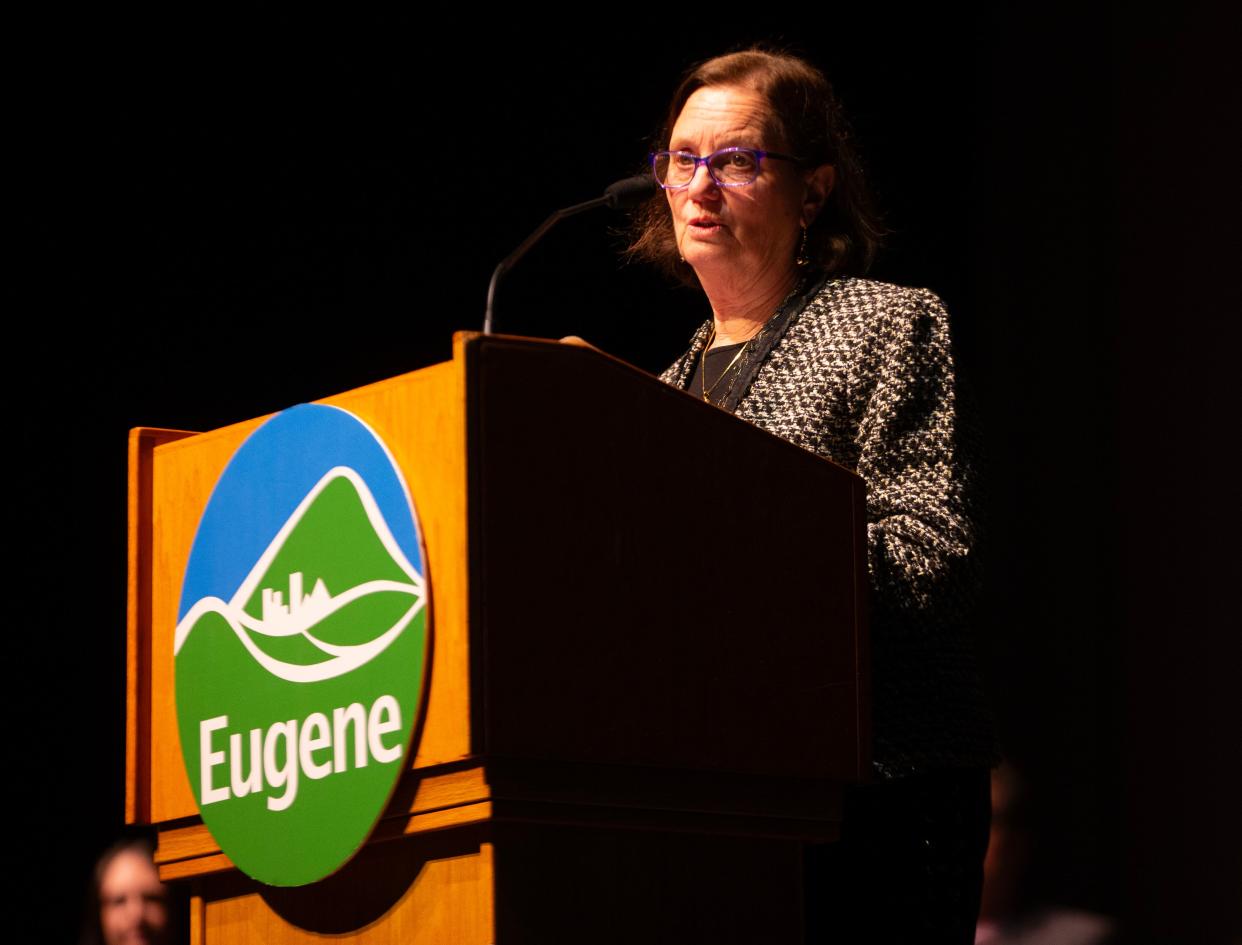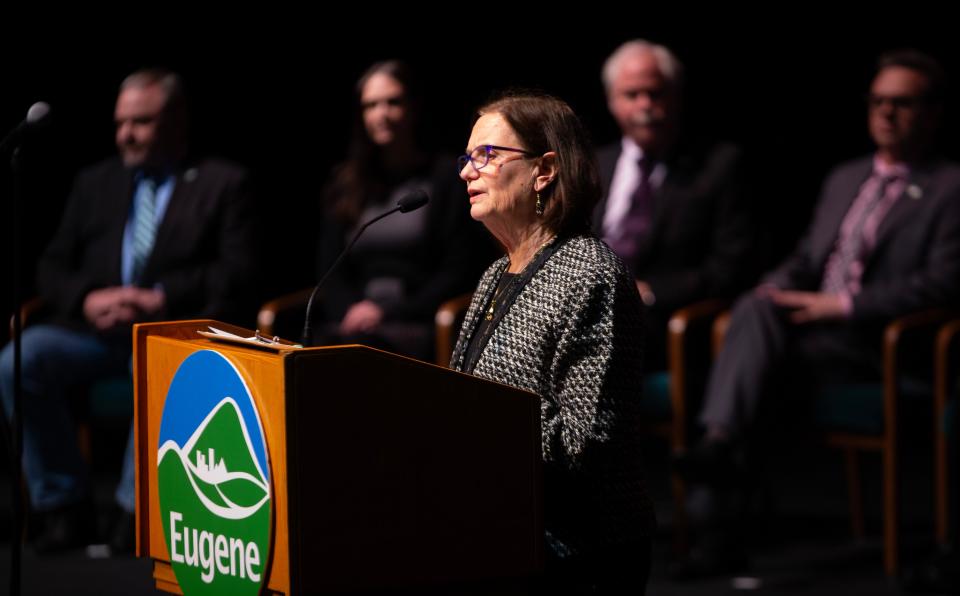Mayor Lucy Vinis delivers Eugene's 'State of the City' address: What to expect in 2024

Award recipients, elected officials, city staff and residents gathered Monday evening in the Hult Center for the 2024 ‘State of the City’ address, presented by Eugene Mayor Lucy Vinis.
Vinis noted this as her seventh time presenting the city address in her final year as mayor.
Along with the annual ‘State of the City’ speech, the evening included the swearing-in of Lyndsie Leech as the City Councilor for Ward 7. The 2024 Bold Steps and Community Service awards were also presented.
Vinis’ speech highlighted three topics: lessons learned in 2023, the city’s priorities for 2024 and the shared values that help guide the work being done.
Lessons learned in 2023
Vinis spoke about three lessons learned that the city plans to account for in its work throughout 2024.
It matters who is at the table
The first lesson Vinis mentioned is that “It matters who is at the table.”
The mayor cited the city’s Land Acknowledgement as necessary to building inclusive relationships with Tribal nations displaced from their native lands which the city of Eugene resides on. The City’s Intergovernmental Tribal Relations Team met with Tribal Governments in Nov. to open discussions with new faces sitting at the table and broadening the scope of the city’s efforts to support and respect Tribal sovereignty.
She said asking questions such as ‘What do we have in common?’ ‘How can we help each other?’ and ‘In what ways are we stronger together?’ have been integral to opening pathways for these more inclusive discussions.
“Many of the tensions we experience in our policy discussions hinge on asking these questions and inviting diverse people to respond and help us break out of entrenched patterns,” Vinis said.
“This effort reflects our commitment to a dynamic, evolving, and more inclusive approach to conversation—and it applies to all of our public engagement efforts.”
Success is a balancing act
Vinis spoke about how policymaking cannot be viewed as a zero-sum game where there are winners and losers if progress is to be made.
One such policy enacted by the City Council in 2023 included renter protections. The mayor’s takeaways from public testimonies and the ongoing difficulties with the housing market in Eugene involve avoiding inaction with proactive work and responding to challenges by making strategic paths toward better solutions.
“The path begins with a few steps. If it doesn’t work, we can recalibrate,” Vinis said.
“Recalibrate. That word is important because it reflects that we are always seeking balance, and it may have to be adjusted—that we get to 'better' incrementally. But if we measure our work as a one-time effort with winners and losers, we will all lose in the end because we will have lost sight of our common interests and goals.”
Be willing to change course
The first couple months of 2023 saw back and forth within the community about a city-enacted ban on the inclusion of natural gas and fossil fuel infrastructure in new low-rise residential developments. This choice was vocally disputed across Eugene and by summer, the council had repealed the ordinance.
From this experience, Vinis said at times, the best course of action can be to pivot directions.
A video played during the event that showcased the highlights of 2023 for city councilors. Some notable mentions include ordinances supporting the production of more housing, thanks to voters for passing the parks levy which supports renovation and revitalization of parks around town and the opening of Striker Field in north Eugene as a new recreational space.
Ward 3 Councilor Alan Zelenka said the work the council did in 2023 was difficult to obtain but that focusing on actionable items relating to reducing human impacts of climate change was a highlight of his year.
“This last year has really been a challenge at council,” Zelenka said.
“We struggled with a lot of issues but one of the things we made a lot of progress on was shifting our focus on climate change to actions that significantly reduce greenhouse gasses.”
Priorities for 2024
Vinis named her top priorities for 2024: Climate, Budget, Public Health, and the City Charter.
Climate
Vinis said climate concerns rank at the top of her priorities in the new year because the city can learn from the lessons of 2023 and apply them to climate action policy in the new year.
“Be sure the conversation includes people who express the full array of concerns, strive for balance across those concerns, and build in the ability to recalibrate,” Vinis said.
“The goal this year will be a stronger consensus about the path forward in our response to climate. We all stand to benefit.”
Vinis said this year, city staff will be connecting with businesses and the public to best assess improvements in energy efficiency and adoptions of clean technology. The City Council took action in Nov. to reform parking ordinances to better support climate-friendly development policy and the city is working to implement Climate-Friendly and Equitable Communities framework through 2026 to reduce carbon emissions and provide more climate-friendly options for housing and transportation.

Budget
The budget was discussed next.
Vinis said the city needs to find a more supportive financial structure, as it doesn’t benefit from increased property values due to restrictions in Measures 5 and 50 or from increased income taxes exceeding projections due to the kicker tax rebate. Incrementally created local taxes, such as the construction excise tax or the marijuana tax, along with other city fees, help generate funding to fill the gap left by the lack of a general sales tax in Oregon but not enough to overlook the budget as a whole.
“Eugene is a growing community with an increasing demand for services. But the financial landscape for our city, and for other cities across the state, works against us…” Vinis said.
“The system established in past decades does not adequately fund city services. We have an obligation to reconsider and find a financial structure that can support us in the coming decades.”
Zelenka said the budget is expected to be a major focus of the Council’s in 2024.
“Next year’s gonna be a challenge, I think, from a budget perspective,” Zelenka said.
“We’re looking at an ongoing eight-plus million dollar deficit and we’re focusing in on how to deal with that.”
Public Health
While the city is not formally tasked through its charter with overseeing public health, the city has been increasingly called upon for support in staff dedication, funding and policy direction. The three key concerns with public health are homelessness, pollution in neighborhoods and the closure of the PeaceHealth University District hospital.
Homelessness
Homelessness and the associated mental health and addiction crises are the first concerns noted by Vinis in her address.
“In my last year as mayor, I will continue to advocate for ongoing support from the state to ensure that our successful programs like the safe sleep sites continue to serve; and join mayors from across the country to advocate for federal investments,” Vinis said.
“We understand that the long-term solution is housing, but we must continue to invest in emergency responses until that housing supply is expanded.”
Pollution in neighborhoods
Last year saw the closure of the JH Baxter wood processing plant in Bethel. Following the plant’s closure, neighboring residential yard soils were found to have dangerous levels of carcinogenic dioxins.
Vinis said that while much of the ability to regulate and respond to pollution like this is outside of the city’s authority, the City Council does have ways to protect public health through development standards requiring lower levels of noise or environmental pollution.
“In the case of Bethel in particular, we recognize that earlier development patterns created this unhealthy proximity of industry to residential neighborhoods. Our goal is to avoid this in the future through increased and tightened requirements,” Vinis said.
“We are a public health agency in the sense that we are responsible for zoning and building that ensures the city is a safe place to live, work and play.”
PeaceHealth closure
The recent closure of the PeaceHealth Sacred Heart Medical Center University District’s emergency room is another immediate concern regarding public health according to Vinis.
Vinis said this closure has deep implications for available emergency and health services in Eugene.
“In the fall meeting of my Blue Ribbon Business Panel, this crisis elicited two questions: how do we anticipate issues on the horizon; and how might we coordinate better across jurisdictions?” Vinis said.
“The panel encouraged the city to see this as an opportunity to think bigger and better about how to coordinate and collaborate with the County, the University, and other partners. Crisis is also an opportunity.”
City charter
The final priority for the City of Eugene as expressed by Vinis’ speech is the City Charter. A City Charter describes the structure of the city’s government, and Vinis noted that Eugene’s Charter hasn’t been updated since 2002.
“Our success in meeting these ongoing and emerging challenges is built on the experience and systems that came before and our willingness to think creatively," Vinis said.
"The structures as they currently exist – affecting climate, budget, and public health – need to be re-evaluated."
She said the Charter’s language “does not reflect the city’s emphasis on inclusiveness and a culture of belonging.” Rather than looking for a deep review of the Charter as done in 2002, Vinis said she hopes the council guides a strategic review to update the charter so it aligns more closely with the city’s needs and current practices.
Guiding values
As the city kicks off 2024 with a retrospective look back at its year of work and a foundation of learning to build upon for 2024, Vinis said the shared community values that guide the work being done all center back toward people.
“The purpose behind everything we are doing is people. The value of human life and experience must inform how we grow and improve as a community,” Vinis said.
“Creating a safe space of belonging — whether that’s for a small group of students or the broader community culture — is our key task. Building housing and parks, responding to climate change, creating economic opportunity – the goal is to realize our individual and collective potential.”
Ward 4 Councilor Jennifer Yeh said the ‘State of the City’ address is usually positive and uplifting but that challenges arise when reality is cold, as Vinis noted in her speech with mention of harmful ideologies that the City Councilors have seen first-hand at meetings during public comment periods.
“This is a hard time to do that (be positive), and then also acknowledge that there are real problems and issues that need to be dealt with. At the same time, we have a great community and we have great people here who make it special,” Yeh said.
“You can still celebrate those things even while acknowledging that everything’s not perfect.”
Hannarose McGuinness is The Register-Guard’s growth and development reporter. Contact her at 541-844-9859 or hmcguinness@registerguard.com.
This article originally appeared on Register-Guard: Mayor Lucy Vinis delivers Eugene's 'State of the City' address

